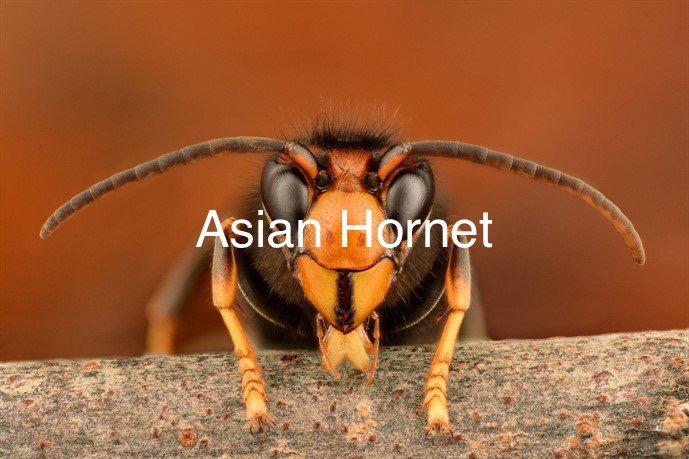Spare a thought for the bees
If you’re fed up with this April weather, just think how fed up the bees are! March was cold, wet and windy – in fact, March was the wettest we’ve had for over 40 years! April hasn’t been much better and the bees are growing in number to the point that they will be want to swarm the minute the weather improves, as they’re bound to be running out of space for the queen to lay.

The blackthorn is in full flower and the bees are taking the opportunity to bring in nectar from it whenever the weather allows, but it has been far too cold, for me at least where are I am, to open the hives and do a Spring inspection. This is one of the few occasions that I go into the hives but is essential to check on the health of the bees. Do they show any signs of disease, does their brood show any signs of disease, has the queen got enough space to lay, is the brood pattern consistent with a queen young enough to see through another season?
So many things to check yet I am unable to do this because of the weather. I know that most of my colonies are strong by virtue of the number of flying bees on a fine day but I haven’t even taken the mouse-guards off yet as the nights are cold enough for mice and voles to be seeking warm, dry, over-night accommodation.
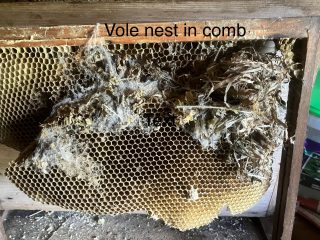 Admittedly, the bees are most likely numerous enough to be able to repel such intruders, but if they are in a tight cluster to keep warm on a cold night, then whey will not break from that cluster as they will surely die from the cold. Not much I can do about it at the moment, though, so I’ll just have to sit tight until the weather improves – as will the bees!.
Admittedly, the bees are most likely numerous enough to be able to repel such intruders, but if they are in a tight cluster to keep warm on a cold night, then whey will not break from that cluster as they will surely die from the cold. Not much I can do about it at the moment, though, so I’ll just have to sit tight until the weather improves – as will the bees!.
Talking of mice and voles, voles in particular can get through the smallest of apertures, so it is important to check every hive to ensure there are no gaps. Unfortunately, one of my smaller colonies fell victim to voles and died out recently.
 The voles had dislodged the entrance closer and entered the hive, presumably on a cold night when the bees were in cluster. They built a nest amongst the combs, using the stores there for their own benefit, but the disturbance was too much for the bees and they succumbed.
The voles had dislodged the entrance closer and entered the hive, presumably on a cold night when the bees were in cluster. They built a nest amongst the combs, using the stores there for their own benefit, but the disturbance was too much for the bees and they succumbed.
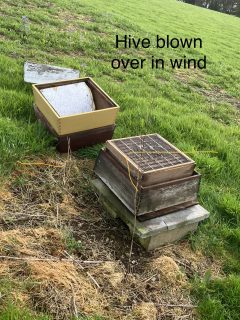
I had a phone call from one of my out-apiaries earlier in the month, at the time we had the high winds. One of my hives had blown over! The owner of the site was driving past the hives, luckily, and saw one of them in pieces, so called me on her mobile. The weather was threatening rain so I quickly packed all my kit into the car and headed off to see if there was any hope for the bees. When I arrived, it looked as if the wind had blown the lifts straight up and off the hive, leaving the hive on its floor.
Luckily, the brood box was quite heavy with stores and was propolised to the floor, so it was still upright, but the crown-board had been blown away leaving the bees exposed to the elements through the queen excluder.
It must have only just happened because the bees appeared to be fine. They were moving around the tops of the frames and seemed quite nonplussed by the event – they certainly seemed a lot calmer about the situation than I was! I was able to rebuild the hive internals, replace the crown-board and replace the lifts and roof, whilst the bees just carried on unfazed, taking no interest in me and causing me no problems, with the occasional bee exiting the hive as usual to go foraging. So that potential catastrophe was saved, thanks to the diligence of the site owner. I was also able to reconstitute the hive before the wet weather came in that afternoon which was a relief.
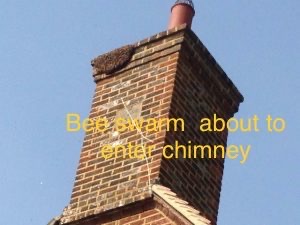 What I must do as soon as I can, though, is place my bait hives around the apiary so that when the bees finally do decide to swarm, they will have somewhere to go – I don’t want them in a chimney or a roof, whether mine or anybody else’s!
What I must do as soon as I can, though, is place my bait hives around the apiary so that when the bees finally do decide to swarm, they will have somewhere to go – I don’t want them in a chimney or a roof, whether mine or anybody else’s!
I will also hopefully be allowed to place a bait hive on my friend’s shed roof again, so that I can capture any black bee swarms that come from her local tree colonies. Again, capturing them in a bait hive will save me from having to retrieve them from a less convenient location.
As well as swarms of honey bees, we need to keep our eyes open for sightings of the Asian hornet at this time of year. Queens will be flying around looking for somewhere to start building their primary nest, normally at about 2 to 3 metres off the ground. It will sometimes be about the size of an orange but will grow with the season. It might be in a shed, garage, wood-store or on the side of a building as well as in a bush.
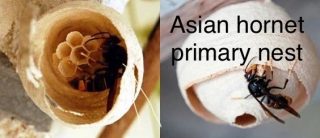 They will lay eggs in this nest, which will be extended by the young hornets that hatch from them, until early summer, when they will decamp to another site, normally at great height deep in the canopy of leafy trees, where they will be more difficult to spot. Two Asian hornets have already been spotted this year, one was in Northumberland whilst the other was in Kent.
They will lay eggs in this nest, which will be extended by the young hornets that hatch from them, until early summer, when they will decamp to another site, normally at great height deep in the canopy of leafy trees, where they will be more difficult to spot. Two Asian hornets have already been spotted this year, one was in Northumberland whilst the other was in Kent.

The one in Northumberland was spotted on a batch of imported cauliflowers from France which formed part of a weekly delivery. It was found about 20 miles north of Newcastle upon Tyne, an important shipping port on the North Sea.
Luckily both hornets were spotted and reported to the National Bee Unit so appropriate action has been taken and hopefully there will be no repercussions from these incidents. So please keep an eye open as once they establish in the UK, the bee populations will suffer greatly, as they have particularly in France and Spain – as if bees didn’t have enough problems to contend with trying to cope with climate change, habitat loss, pesticides and Varroa amongst others.
On that sombre note of warning, I’ll leave you until next month, when hopefully we will have had chance to open our hives and do the all-important inspections. But remember to contact me if you see a swarm – I will arrange for its removal free of charge. If the bees are in a roof space or chimney then unfortunately there will be a charge for their removal as they will be an established colony with combs. However, still let me know and I’ll investigate the options.
Colin Rees 07939 971104 01872 501313 colinbeeman@aol.com

